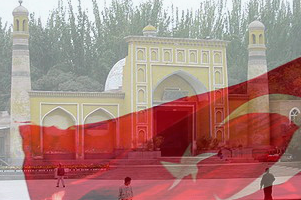Bursalı: Erdogan's alliance with the military means the Kurds will get nothing from him
Orhan Bursalı in Cumhuriyet observes that HDP representatives are now hoping that Erdoğan is going to resume the peace process and that he will make concessions to the Kurds if they back the presidential system that he insists on introducing. But is Erdoğan going to bargain with HDP in the parliament while he is fighting the PKK ferociously on the ground? It’s less likely for the time being. At most, they might consider making minimal concessions to HDP that don’t threaten the unitary state, when they think that they are close to “finishing off the matter.” And this is because of the alliance between Erdoğan/AKP and the Turkish Armed Forces (TSK). The greatest ally of the AKP in the country is the TSK. One reason why Erdoğan is able to pursue his authoritarianism so brazenly is the “alliance” he has entered into with TSK. They have reached an agreement with TSK on the war against PKK, on the unitary integrity etc. Erdoğan cannot step outside these limits, until a new situation. That means it’s probably not on the agenda to seek endorsement from HDP in order to get an amended constitution accepted in parliament.
Cemal: an alliance of Erdogan and the military against democracy?
Hasan Cemal on the t24 news site writes that the military and Erdoğan have converged on three points, and that there does not seem to be any disagreement at all between them. The three points are the Kurdish problem, the fight against PKK and northern Syria… I wonder if not a fourth point could be added to these three, and that is about democracy. Democracy and the rule of law no longer figure on Tayyip Erdoğan’s agenda. There is an Erdoğan on the stage that has turned his back on the West and who dislikes the EU… Erdoğan is facing east. He has his gaze on Russia, Central Asia, China, and of course on the Islamic world. This eastern orientation was quite strong among the military during especially the 1990’s and during the first years of the 2000’s. The big pashas used to say “The European Union means first class democracy. Turkey is not ready for such a democracy; it would lead to our breakup. Let’s make an opening to the East, to Russia, China; that would be much better for Turkey…” Could it be that Erdoğan and the military have met at the same point – that is in a common “antipathy toward democracy” – or perhaps more accurately in a shared “fear of democracy,” as Turkey is swinging from “military tutelage” to “civilian despotism?” Yes, I’d say that’s possible. Would not Erdoğan’s civilian despotism be strengthened when he sort of designates the military to deputize him? If this is indeed the case, it most certainly would strengthen his despotism.
Turkey and China: Merging Realpolitik with Idealism
By Hay Eytan Cohen Yanarocak (vol. 8, no. 15 of the Turkey Analyst)
Despite the importance and improvement of multi-dimensional Turkish-Chinese relations, Turkish decision makers have had difficulties reconciling their Pan-Islamic ideological rhetoric and the demands of realpolitik. While Ankara recognizes the need to form good relations with China, its self-assigned role as the protector of “oppressed Muslims” has, so far, trapped Turkey between realpolitik and the purism of ideology. Having acknowledged this clash, President Recep Tayyip Erdoğan has moved to neutralize the discord that has existed between Turkey’s national interests and its Pan-Islamic ideological rhetoric. Erdoğan’s new China strategy promises to pave the way for solid, stable relations between Turkey and China.

Turkey Raises Central Asian Profile Through SCO Link
By Richard Weitz (vol. 5, no. 14 of the Turkey Analyst)
The decision of the June 6-7 annual meeting of the heads of state of the Shanghai Cooperation Organization (SCO) in Beijing to designate Turkey a formal dialogue partner of the organization is yet another sign of recognition of Turkey’s growing influence in Central and South Asia. Turkey’s new status may also reinforce Ankara’s influence in the region, especially now that other NATO members are reducing their presence in Afghanistan. But Turkey still confronts major obstacles to pursuing its ambitious diplomatic agenda in Central and South Asia. China was likely supportive of deepening the SCO’s ties with Turkey, but Turkey’s relations with Russia might worsen, which in that case will constrain Turkish influence in Central Asia.
The "Eastern Dimension" in Turkish Foreign Policy Grows
By M. K. Kaya (vol. 2, no. 18 of the Turkey Analyst)
Although uncertainty and complications remain, the agreements signed between Turkey and Armenia indicate the potential in expanding Turkey’s possibilities of access to the Caucasus and Central Asia. Furthermore, the cooperation agreements that have recently been signed among Turkic states are destined to eventually have far-reaching cultural, economic and political repercussions. But in these, a leading role is increasingly taken not by Turkey but by Kazakhstan and Azerbaijan.


